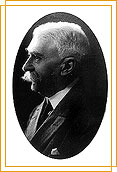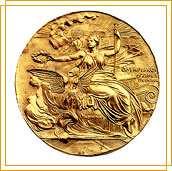The revival of the ancient Olympic Games
"The idea of the revival of Olympic Games was not a passing fancy: it was the logical culmination of a great movement. The 19th century saw the taste for physical exercises revive everywhere ...  At the same time the great inventions, the railways and the telegraph have abridged distances and mankind has come to live a new existence; the peoples have intermingled, they have learned to know each other better and immediately they started to compare themselves. What one achieved the other immediately wished also to endeavour: universal exhibitions brought together to one locality of the globe the products of the most distant lands; Literary or scientific congresses have brought together, into contact, the various intellectual forces. How then should the athletes not seek to meet, since rivalry is the basis of athletics, and in reality the very reason of its existence?" At the same time the great inventions, the railways and the telegraph have abridged distances and mankind has come to live a new existence; the peoples have intermingled, they have learned to know each other better and immediately they started to compare themselves. What one achieved the other immediately wished also to endeavour: universal exhibitions brought together to one locality of the globe the products of the most distant lands; Literary or scientific congresses have brought together, into contact, the various intellectual forces. How then should the athletes not seek to meet, since rivalry is the basis of athletics, and in reality the very reason of its existence?"
[Baron Pierre de Coubertin, in Beck, Ch. (ed.), Oi Olympiakoi Agones, 776 BC - 1896, (The Olympic Games, 776 BC - 1896) Athens 1896].
In order to unify the athletic events that were popular in various countries and the transformation of the notion of rivalry into noble competition, free from the notion of profit, it was decided to make:
"competitions at regular periodical intervals at which representatives of all countries and all sports would be invited under the aegis of the same authority, which would impact to them a halo of grandeur and glory, that is the patronage of classical antiquity. To do this was to revive the Olympic Games: the name imposed itself: it was not even possible to find another."
[Baron Pierre de Coubertin, in Beck, Ch. (ed.), Oi Olympiakoi Agones, 776 BC - 1896 (The Olympic Games, 776 BC - 1896), Athens 1896].
The above text illustrates in a lively way what people in the 19th century believed about the revival of the Olympic Games.  However, it does not reveal anything about the first attempts of Greeks to revive the Olympic Games, long before the birth of the Baron de Coubertin. Later, in 1896, the 1st International Olympic Games took place in Athens. Many people contributed to the realization of the Olympic Games. In the 19th century the social structure of the national states was ideal for the gradual acceptance of the Olympic Idea in a new -national- framework. The symbolism of the Olympic Games reveals to us today the process through which people learned the new notions of their era. However, it does not reveal anything about the first attempts of Greeks to revive the Olympic Games, long before the birth of the Baron de Coubertin. Later, in 1896, the 1st International Olympic Games took place in Athens. Many people contributed to the realization of the Olympic Games. In the 19th century the social structure of the national states was ideal for the gradual acceptance of the Olympic Idea in a new -national- framework. The symbolism of the Olympic Games reveals to us today the process through which people learned the new notions of their era.
|
